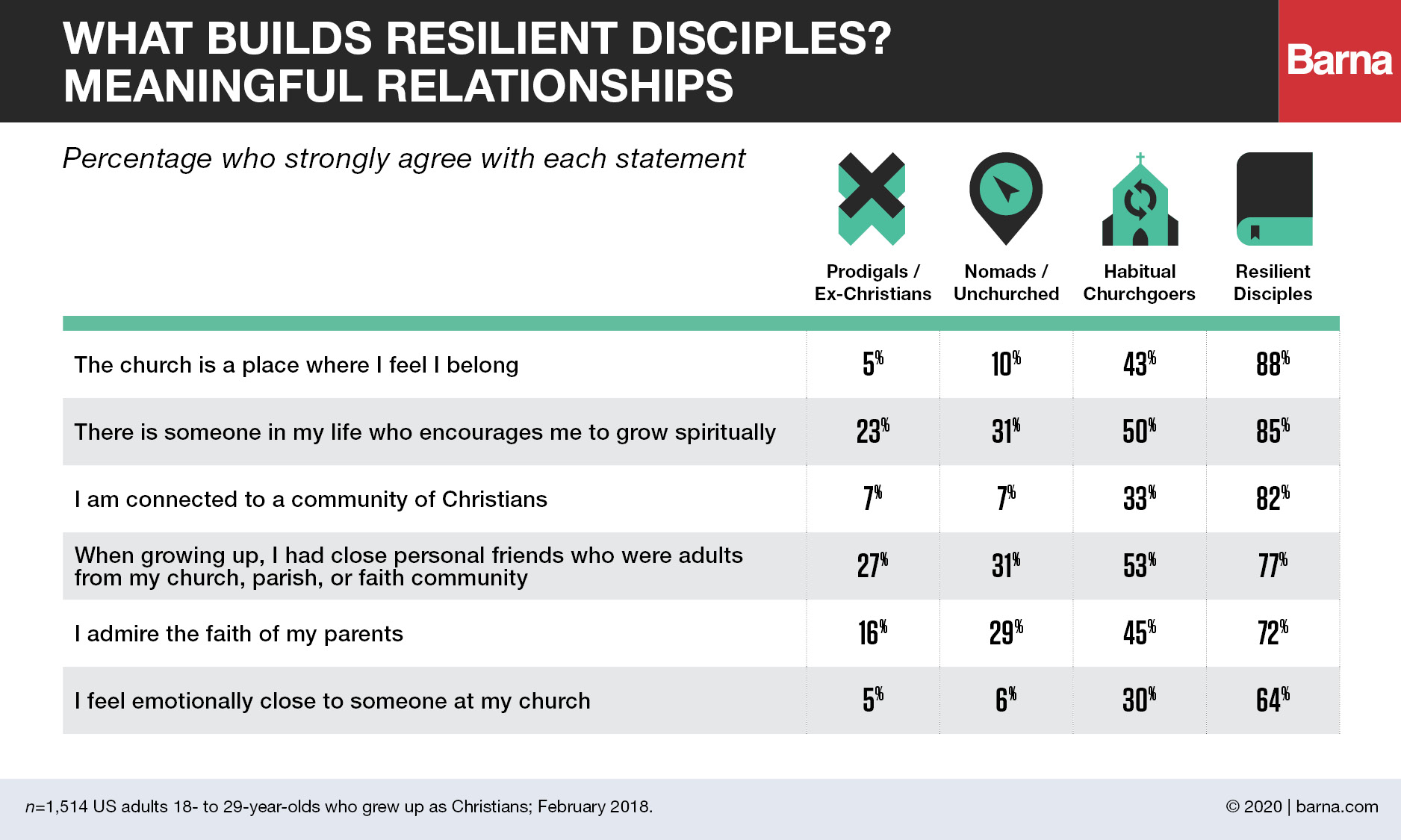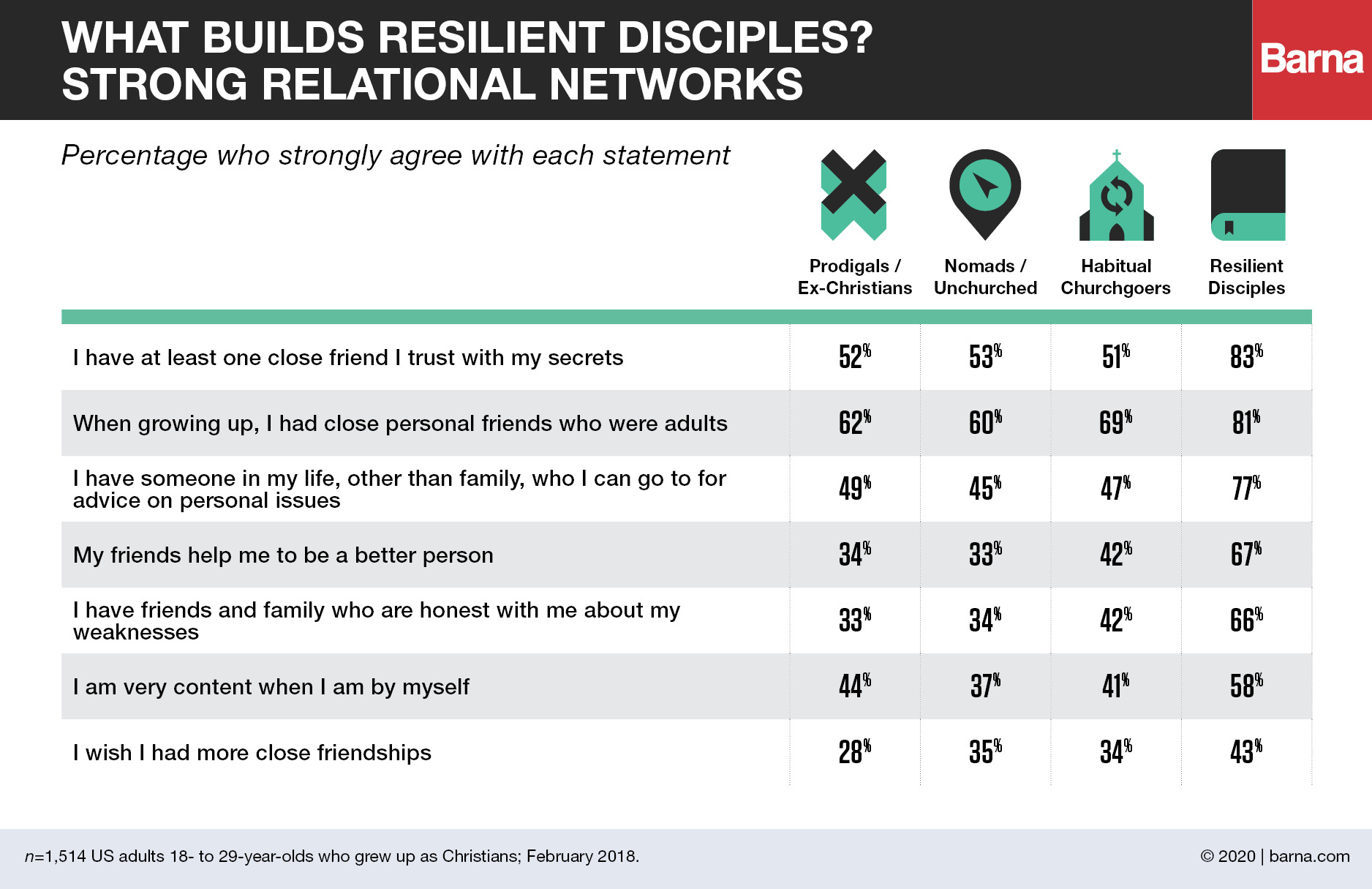
“Over the years, Barna has been one of my main staples for understanding culture and now especially as we try to figure out how to reach out to the Next Generation. I think this is one of the most important blogs I have read in a very long time. Also, many of you may want to look further into a very innovative subscription model called Barna Access Plus. I trust the leadership at Barna to be incredibly excellent. For more info go to Barna.com.” –Jim Burns
In Faith for Exiles, co-authors David Kinnaman and Mark Matlock discuss five practices that contribute to resilient discipleship and flourishing faith in young adults. Today, in an excerpt from this research, we’ll take a closer look at one of the main aspects of resilience—relationships—and discuss how churches and parents can come alongside young people to support and encourage them in their spiritual walk through strong connections.
Connection Is Key in Building Resilient Disciples
We often see young people who grew up Christian express negative reactions when the Church is brought up in conversation, reactions that are often rooted in strong emotions, including pain, disconnection, emotional distance, skepticism and withdrawal.
While some church leaders act more like entrepreneurs and showmen than prophets and shepherds, churches have generally lost their influence in local communities. This generation is the first to form their identities—and their perception of church—amid high-profile scandals and sky-high levels of skepticism.
At the same time that the Church is fighting back perceptions of irrelevance and extremism, social pressure is leading to more isolation. All of this means that young people have to travel a long road in order to find supportive relationships, inside or outside the Church.
Resilient disciples’ connections in the Church are far and away more extensive than those young people Kinnaman and Matlock categorize as habitual churchgoers, nomads or prodigals (click here for more on the definitions of these four terms, or review About the Research below). The vast majority of resilient disciples firmly asserts that “the church is a place where I feel I belong” (88%) and “I am connected to a community of Christians” (82%). Fewer than half of habitual churchgoers experience this kind of relational connectedness. Further, the emotions resilient disciples feel in their church are far warmer and more positive than others experience. Their churches feel like a family and are made up of the people they want to be around.
Rediscovering Relationships Within the Church
Mistrust and isolation cut at the heart of human and Christian community. The Church can and should provide answers to the deepest questions of humanity and through Jesus. In this case, our search for relational intimacy and supportive, others-oriented community is found in the Church.
In exile, the Church can provide answers to a relationally hurting society. The Christian community today has an amazing opportunity to address the epidemic of isolation and counteract the atomizing effects of “digital Babylon”—and thereby diminish the mistrust and isolation we’re all experiencing.
Resilient disciples have robust faith in many different dimensions of their lives. They are far more relationally well-rounded that others their age. More than three-quarters say they have “at least one close friend I trust with my secrets” (83%), “when growing up, I had close personal friends who were adults” (81%) and “I have someone in my life, other than family, who I can go to for advice on personal issues” (77%).
Two-thirds agree that “my friends help me be a better person” (67%) and “I have friends and family who are honest with me about my weaknesses” (66%). More than half (58%) firmly agree with the idea that “I am very content when I am by myself,” which is another indicator of relational wholeness.
In comparing resilient disciples to the other young adults who grew up as Christians, it’s striking to see that being a resilient disciple—which is based on a set of questions about theology and faith engagement—correlates to overall relational well-being. These findings affirm that the Church can help fill a massive gap in our society: the desire to be loved, to be acknowledged for more than what we produce and to be known. But how can the Church do this?
Data show that resilient disciples’ sense of belonging correlates with intergenerational friendships and a positive emotional climate. About three in five resilient disciples say “I feel valued by people in my life who are older than me” (65%) and “I welcome positive criticism from those who are older than me” (60%). These are connections that can be forged and maintained in a church community. Another three-quarters say that, as a part of their church community, they feel “loved and valued” (83%) and “like I am part of a family” (76%). Sixty-three percent say they feel “relief from the anxiety of daily life” (63%).
The Church plays an integral role in not only supporting resilient disciples in their spiritual journey, but also in helping habitual churchgoers grow stronger in their faith and inviting nomads and those who have left the Church back into a loving and deeply relational community of believers.
While the current moment adds to the complexity of cultivating long-lasting relationships within the Church, it also underlines the need for these connections. To assess how your church is actively promoting strong relationships, sit down with your staff and ask: How can we equip our leadership team and congregants alike to support the relational well-being of others, especially young people? How do we encourage congregants to make meaningful connections with others? What measures are in place for us to identify and assist those who are struggling to forge new friendships?



 Good News for Parents of Moody Teens: It Will Pass
Good News for Parents of Moody Teens: It Will Pass  Who is that Stranger in My House?
Who is that Stranger in My House?  Food Choices Could Influence First Period
Food Choices Could Influence First Period